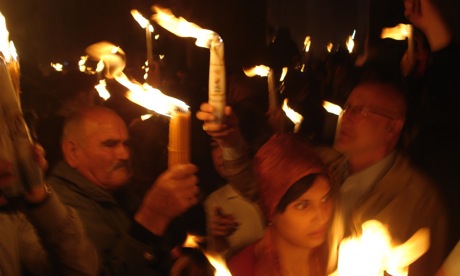Easter will be five weeks late for Catholics in the Holy Land. Easter Sunday will be on May 5 because the Catholic Church will celebrate Easter according to the Orthodox calendar.
For pastoral and ecumenical reasons, the Latin Patriarchate of the Holy Land has decided from this year onwards to follow the Orthodox liturgical schedule.
The change will come as a relief for many mixed families, whose Catholic and Orthodox members up till now have had to celebrate Easter on different dates.
It will also help overcome the impression of division among Christians. A Palestinian man, Ghassan Rafidi, the son of a Catholic mother and a Greek Orthodox father, says: “The Muslims always ask us how many Jesuses do we have.”
“The main reason for the unification of the Easter celebration is for members of the same family, village and parish to be able to have one celebration, and one calendar, and to show the unity and enjoy the unity. We want to give a good example of unity to our non-Christian neighbours,” said the Latin Patriarchate chancellor, Auxiliary Bishop William Shomali.
Bishop Shomali said although the Catholics did not ask the Greek Orthodox Church to celebrate Christmas according to the Gregorian calendar, he expects they will do so to unite Christians for that feast.
The change will apply throughout Palestine, Israel, Jordan and Cyprus.
Exceptions will apply for Jerusalem (where Christ’s Resurrection occurred), Bethlehem and Tel Aviv, where Easter Sunday this year will fall on March 31 — the same date as for the rest of the Catholic world.
The dating of Easter was fixed following the Council of Nicea in AD 325. It was to be celebrated on the first Sunday following the full moon after the northern hemisphere’s vernal equinox (which is reckoned to be March 21).
The reason for the difference between Catholic and Orthodox dates goes back to 1582, when Pope Gregory XIII introduced the Gregorian calendar to correct a miscalculation in the rotation of the earth.
The Orthodox continued to use the Julian calendar, which dates back to Julius Caesar.
Sources:
Latin Patriarchate of Jerusalem
Image: Travelujah
